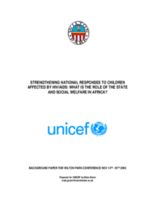Report on Wilton Park Conference (WPS05/30)
Monday 14 – Wednesday 16 November 2005
HIV and AIDS is described as a lens through which to look at child poverty. Different countries will require different responses, but there is a need for stakeholders to agree to an overarching framework for social welfare and social protection.
An ‘effective’ state has some productive capacity, a civil service, and provides health, education, and a social security system. In OECD countries, spending on social security for the poorest and most vulnerable is recognised as fundamental to poverty reduction.
Social movements in Namibia and South Africa spurred the development some of the most effective systems in the region. Social security should be seen as an investment in a transformative agenda. People who cannot work should be supported through the state.
The lack of adequate funding is as a major barrier to effective social welfare and this issue needs to be put firmly on the political agenda. There needs to be a robust examination of costs to convince international partners that social funds are cost effective and appropriate.
Note: Wilton Park Reports are brief summaries of the main points and conclusions of a conference.
©UNICEF

